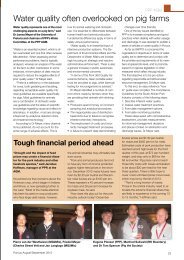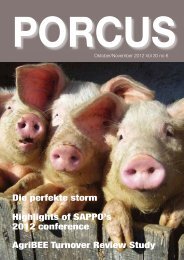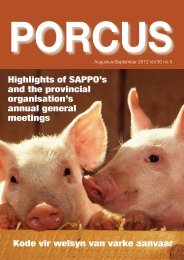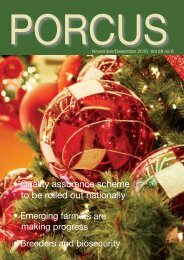porcus - sappo
porcus - sappo
porcus - sappo
You also want an ePaper? Increase the reach of your titles
YUMPU automatically turns print PDFs into web optimized ePapers that Google loves.
Promotion<br />
Working together, was the key message<br />
to come out of a meeting between<br />
British pig producers and UK<br />
Farm Minister Jim Paice to discuss<br />
the forthcoming European Union<br />
(EU) ban on stalls and tethers.<br />
The meeting, which also involved<br />
British Pig executive director, Mick<br />
International<br />
UK pig producers, government<br />
discuss EU stall ban<br />
Pork seized<br />
in China<br />
A total of 200kg pork meat, thought<br />
to be injected with water, was<br />
seized by Songjiang district authorities<br />
in China.<br />
The pork meat was suspected of<br />
being injected with water, following<br />
a report by a consumer who<br />
purchased 5kg pork from a wet<br />
market and who later found that the<br />
meat had leaked a lot of water. The<br />
consumer reported the incident to<br />
authorities. This prompted authorities<br />
to inspect all eight vendors at<br />
the market, leading to two vendors<br />
being questioned.<br />
When water is injected into the<br />
animal, usually before slaughter,<br />
it slows down the movement of<br />
animals’ stomachs, and this leads to<br />
food residue staying in the stomach<br />
and letting out harmful chemicals,<br />
such as ammonia and cresol. This<br />
means that the meat could contain<br />
chemicals, which could be harmful<br />
to humans. Water injected meat<br />
is also carried out to increase the<br />
weight of meats like pork and beef.<br />
The water used for injection is also<br />
questionable, as polluted water is a<br />
concern.<br />
English.Eastday.com<br />
36<br />
Sloyan, Zoe Davies of the National<br />
Pig Association and Stewart Houston,<br />
who is chairman of both organisations,<br />
also highlighted several other<br />
upcoming industry measures. “While<br />
the focus of the meeting was defi -<br />
nitely on the stalls ban, we reminded<br />
each other that there were one or<br />
two other measures coming in at<br />
Pigs with<br />
built-in defence<br />
against diarrhoea<br />
Scientists at a Danish University are<br />
investigating whether genetic resistance<br />
to E. coli infections is a sustainable<br />
approach to fi ght diarrhoea in<br />
pig production.<br />
If all pigs could avoid the diarrhoea<br />
caused by E. coli infections, life would<br />
be a lot easier for millions of pigs and<br />
for thousands of farmers.<br />
The resistance to E. coli is caused<br />
by a mutation on the FUT1 gene,<br />
but there has been no strategy to<br />
include this mutation in breeding<br />
programmes. The crucial issue is to<br />
investigate whether the resistance to<br />
E. coli could have other signifi cant<br />
biological side-effects on animals.<br />
This is what the new project will examine.<br />
The scientists will compare the<br />
pigs that carry the FUT1 mutation with<br />
pigs that do not carry the mutation<br />
for a number of different parameters.<br />
They will, for example, examine how<br />
the FUT1 gene affects the colonisation<br />
of the intestines with benefi cial microbiota,<br />
as this colonisation is crucial<br />
both for the health of the gut and for<br />
the pig’s health generally.<br />
The additional knowledge about<br />
the structure and function of specifi c<br />
receptor molecules that the scientists<br />
will obtain can be used to develop<br />
new preventive and therapeutic<br />
medicines for E. coli infections in both<br />
animals and humans.<br />
PigProgress.net<br />
the same time,” said Sloyan. “These<br />
include slat design, stocking rates for<br />
pregnant gilts and sows and overall<br />
fl oor areas. It was agreed the government<br />
would write to all registered<br />
pig producers reminding them of the<br />
changes.”<br />
WattAgNet.com<br />
McDonalds<br />
supports<br />
humane<br />
handling of<br />
animals<br />
The McDonald’s Corporation announced<br />
that it will require of its US<br />
pork suppliers to outline their plans<br />
to phase out of the use of sow gestation<br />
stalls.<br />
“McDonald’s believes gestation<br />
stalls are not a sustainable production<br />
system for the future. There are<br />
alternatives that we think are better<br />
for the welfare of sows,” said Dan<br />
Gorsky, senior vice president of<br />
McDonald’s North America Supply<br />
Chain Management. “McDonald’s<br />
wants to see the end of sow confi<br />
nement in gestation stalls in our<br />
supply chain. We are beginning an<br />
assessment with our US suppliers to<br />
determine how to build on the work<br />
already underway to reach that goal.<br />
In May, after receiving our suppliers’<br />
plans, we’ll share results from the assessment<br />
and our next steps.”<br />
McDonald’s actions are backed by<br />
leading independent animal welfare<br />
experts.<br />
nationalhogfarmer.com<br />
Porcus Januarie/Februarie 2012







